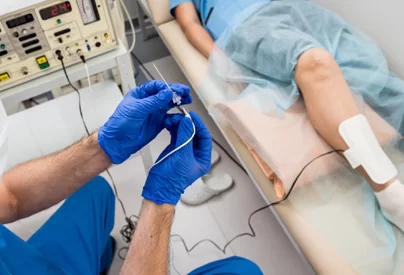Vascular / Endovascular Surgery

Vascular / Endovascular Surgery
Vascular/Endovascular Surgery is a surgical specialty that focuses on the diagnosis, treatment, and management of conditions affecting the vascular system, which includes arteries, veins, and lymphatic vessels.
Key Features
Vascular Surgery
- Definition: Vascular surgery involves open surgical procedures to address issues in the blood vessels.
- Common Conditions Treated:
- Aneurysms (bulges in blood vessels)
- Peripheral artery disease (PAD)
- Carotid artery disease (narrowing of arteries supplying the brain)
- Varicose veins and venous insufficiency
- Deep vein thrombosis (DVT)
- Procedures:
- Bypass Surgery: Creating a new pathway for blood flow around a blocked artery.
- Aneurysm Repair: Surgical intervention to repair an enlarged blood vessel.
- Endarterectomy: Removing plaque from the inner lining of an artery.
Endovascular Surgery
- Definition: Endovascular surgery is a minimally invasive approach that involves accessing the vascular system through small incisions, usually in the groin or arm.
- Common Procedures:
- Angioplasty and Stenting: Using a balloon to open narrowed arteries and placing a stent to keep them open.
- Endovascular Aneurysm Repair (EVAR): A minimally invasive technique to repair aneurysms using a stent graft.
- Thrombectomy: Removing a blood clot from a blood vessel.
- Benefits: Endovascular techniques often result in shorter recovery times, reduced pain, and lower risk of complications compared to traditional open surgery.
Training
Surgeons specializing in vascular and endovascular surgery undergo extensive training, completing a residency in general surgery followed by a fellowship focused on vascular surgery.

